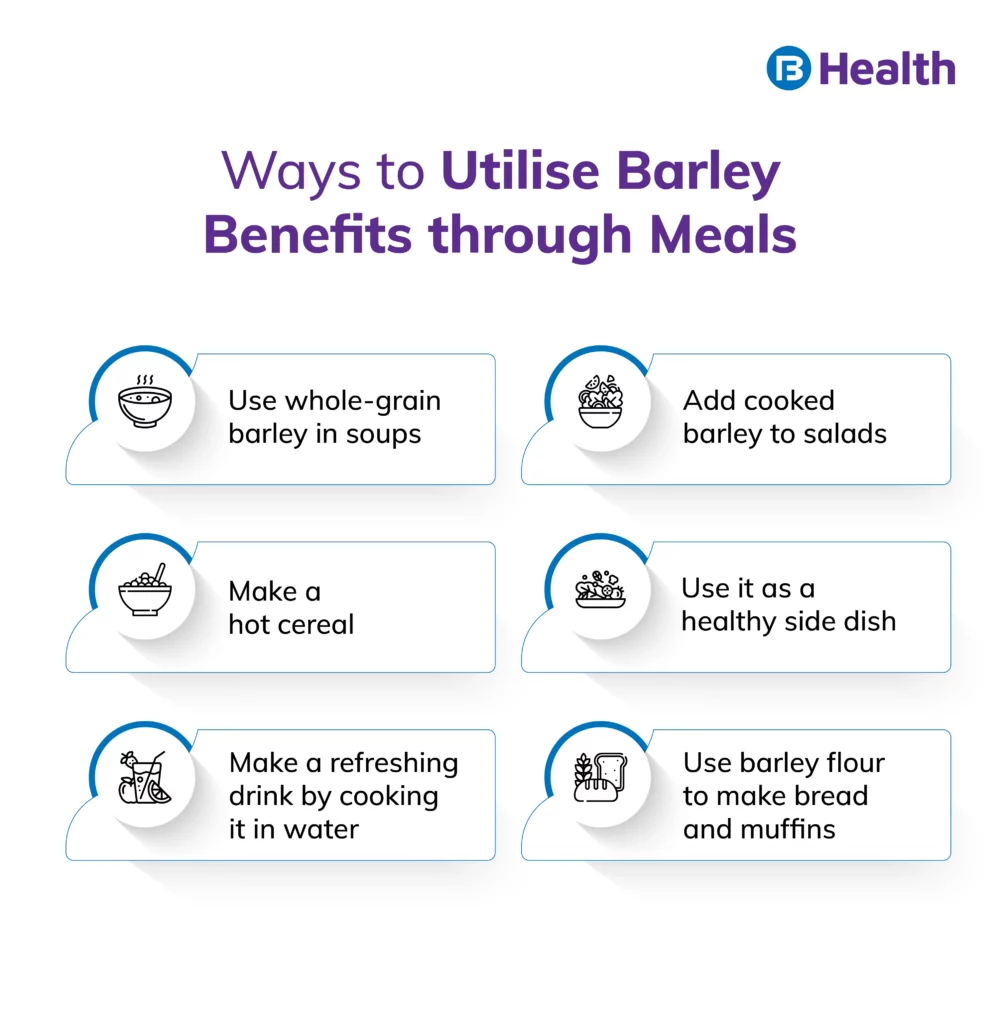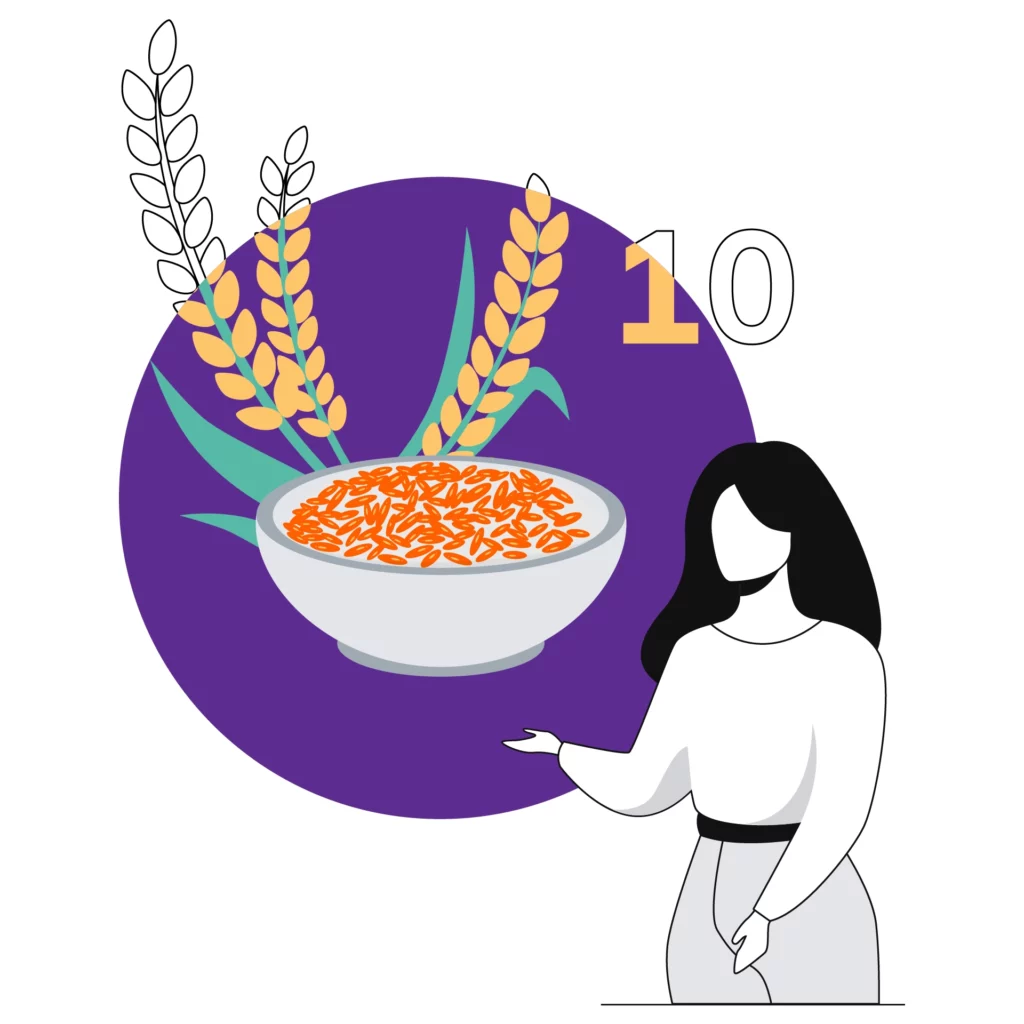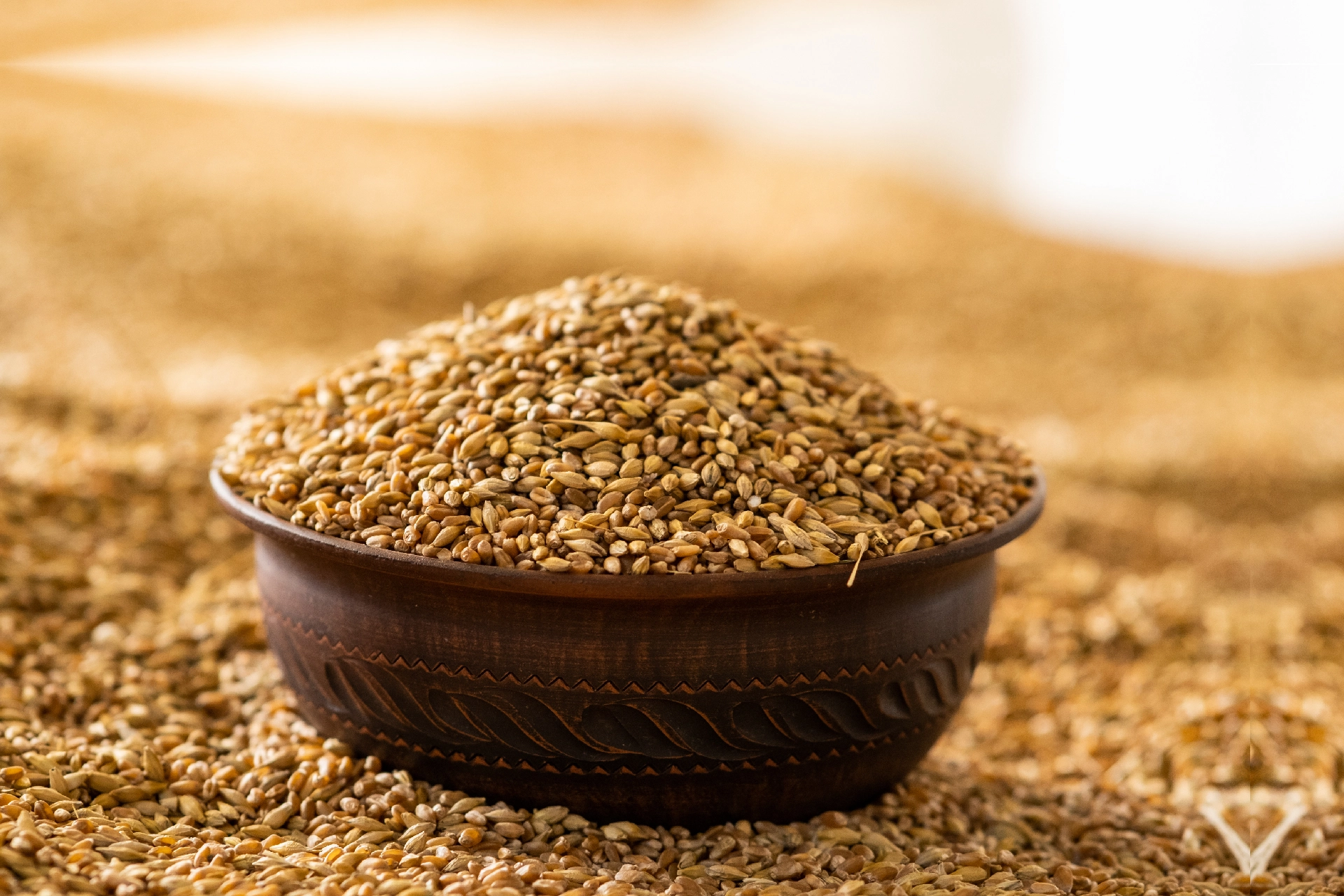Nutrition | 7 min read
Barley: 10 Impressive Health Benefits, Side Effects, Dosage
Medically reviewed by
Table of Content
Synopsis
Barley is a nutrient-dense whole grain that helps lower cholesterol and blood pressure, promotes digestive health, manages weight, and maintains healthy blood sugar. Its high fibre content keeps you feeling full longer and aids regular bowel movements. Adding barley to your diet can help reduce the risk of chronic diseases and promote overall health.
Key Takeaways
- Barley contains manganese, copper, magnesium, Vitamin B, and selenium
- Barely can be consumed as a soup, salad or even rice substitute
- Gluten-intolerant people face side effects such as indigestion and allergic reaction
Barley benefits you immensely as it has high nutritional value and other important vitamins and minerals in abundance. This nutty-flavored crop belongs to the grass family and originally hails from Eurasia. Whether enjoyed as a meal or used in the brewing of beer and whiskey, barley's versatility knows no bounds. In this blog, we shall look at more barley benefits and side effects, uses, precautions, nutritional facts, and dosage.
What is Barley?
Barley or Haredim vulgare is an ancient grain with a fascinating history that spans thousands of years. It is now a major cereal crop in India and all over the world. What sets it apart from other crops is its ability to thrive in harsh conditions, making it a vital crop in modern agriculture. Some of the barley benefits include overall well-being, better cardiovascular health, and a lower risk of certain cancers. [1]
Impressive Health Benefits of Barley
Reduces hunger and aids weight loss
One of the major barley benefits is it helps reduce weight. Barley is high in fibre, which keeps you full for a long time and reduces hunger. As a result, it reduces calorie consumption, resulting in weight loss.
In the gut, the soluble fibre in barley, known as beta-glucan, forms a gel-like substance. It promotes nutrient absorption and fullness by slowing digestion. Barley is low in calories and has an impressive amino acid profile, which can aid in weight loss and management. [2]
Constipation prevention
Barley's high fibre content also aids in constipation prevention. Fibre adds weight to your food and lets it pass easily through your digestive tract, improving the digestive process as a whole. This helps boost your metabolism and makes you feel lighter. Additionally, barley benefits your intestinal health and also relieves stomach bloating. [3]

Protects against gallstones
Next on the list of barley benefits is protection against gallstone formation. Studies have shown that barley can reduce the risk of gallstones by up to 28%. [4] This is likely due to barley's high fibre content, which helps reduce cholesterol in the bile, thereby preventing gallstone formation. Barley also contains plant compounds such as lignans and saponins, which may help to bind bile acids and further reduce the risk of gallstone formation. Another way barley prevents gallstones is by lowering inflammation in the body.
Reduces cholesterol levels
Barley is one of the foods that lower cholesterol. Beta-glucan in barley lowers LDL (bad) cholesterol levels by binding to bile acids. As a result, barley raises HDL (good) cholesterol while decreasing triglyceride levels. [5]
Lowers the risk of heart disease
Consuming barley benefits your heart health. Flavonoids, which help protect against heart disease and cancer, are found in barley. As a result, risk factors such as high cholesterol levels are reduced (LDL). A decrease in these factors lowers the risk of heart disease. Furthermore, Tools, which are phytochemicals found in barley, have antioxidant properties that reduce the risk of stroke. [6]
Beneficial for diabetes
Barley is high in magnesium, a mineral necessary for insulin production and sugar utilization in the body. Magnesium can help to reduce blood sugar spikes. As a result, eating barley benefits your health by lowering your risk of developing prediabetes and type 2 diabetes. [7]
Colon cancer prevention
Barley's benefits include a lower risk of developing colon cancer. The insoluble fibre in barley reduces the time it takes for the gut to clear, which protects against colon cancer. Whereas soluble fibre binds harmful carcinogens in the gut. Antioxidants, phytic acid, phenolic acid, and saponins are all compounds present in barley that protect against cancer. [8]
Enhances bone and tooth health
One of the barley benefits is that it improves bone health by making bones strong and protects your teeth, reinforcing enamel to protect against cavities. This is because barley contains a high amount of phosphorus, calcium, copper, magnesium, and zinc. Barley also contains vitamin C, which aids in the healthy development of bones.
Boosts skin and hair health
Barley contains a high concentration of vitamin C, antioxidants, and minerals. As a result, barley benefits skin health by lowering oxidative stress. Zinc has an anti-inflammatory effect on the skin. In addition, barley is high in selenium, which helps to maintain skin elasticity. It tightens the skin and removes toxins from the body. Barley also contains copper and iron, which reduces hair loss and maintains healthy hair growth.
Controls high blood pressure
High blood pressure is a dangerous medical condition that can lead to coronary heart disease, heart attack, stroke, heart failure, kidney failure, and other serious health issues. The presence of fibre and niacin in barley helps to reduce the risk of hypertension. Long-term barley eaters have lower systolic blood pressure and are less likely to develop high blood pressure. Regular consumption of barley benefits you by preventing cholesterol build-up in the arteries of the heart.
Additional Read: High-fiber foods for diabetics
Barley Uses
The barley uses and benefits are endless. It is a multi-functional ingredient that can get used in several dishes to enhance flavor and nutritional value. Here are some barley seeds used for your meals:
- Use whole-grain barley in soups for texture and taste
- Add cooked barley to salads to create a filling base
- Make hot cereal by cooking barley in water or milk
- Use barley instead of white rice or potatoes as a healthy side dish
- Add semi-cooked barley with milk and honey to cereal
- Make a refreshing drink by cooking barley in water, then straining it
- Use barley flour to make bread and muffins
Precautions
- People allergic to beer or barley flour should avoid consuming barley products because they can cause severe allergic reactions or skin rashes
- Although barley has anti-inflammatory properties, gluten-intolerant individuals should avoid it. Do not consume barley if you have celiac disease and cannot digest gluten. Rather, opt for gluten free foods
- The high fibre content of barley may interfere with the absorption of medications taken orally. It is advisable to have medications 1 hour before or 2 hours after eating barley
- Barley may lower blood sugar levels. It is best to avoid taking it with medications, herbs, or supplements that lower blood sugar
- Pregnant women should avoid consuming large amounts of barley sprouts
Even though there are a lot of barley benefits, before adding anything new to your diet, you should get a general physician consultation.
Side Effects Of Barley
While barley is generally considered safe to eat, some individuals may experience side effects from consuming it. Allergic reactions to barley are rare but can cause severe symptoms such as hives and difficulty breathing. Additionally, consuming too much fibre from barley can cause digestive issues like bloating and diarrhoea. The barley side effects also include low blood sugar levels. It's best to monitor your glucose levels when drinking barley water regularly.
If you experience any adverse effects after consuming barley, get a doctor consultation as soon as possible.
Additional Read: Carbohydrates foodsNutritional Value of Barley
The chart below shows the nutritional values of barley.
Nutrient | Amount |
Carbohydrate | 57.9 ± 5.1 % |
Dietary fibre | 29.5 ± 15.5 % |
Protein | 27.3 ± 4.3 % |
Fat | 4.57 ± 1.31 |
Vitamin A | 20.5 ± 4.7 mg/100g |
Vitamin B1 | 0.61 ± 0.40 mg/100g |
Vitamin B2 | 1.56 ± 0.65 mg/100g |
Vitamin B3 | 7.18 ± 7.39 mg/100g |
Vitamin B6 | 1.12 ± 0.97 mg/100g |
Vitamin B12 | 1.16 ± 0.26 mg/100g |
Vitamin C | 251.6 ± 239.1 mg/100g |
Vitamin E | 15.0 ± 14.1 mg/100g |
Sodium | 328.2 ± 288.4 mg/100g |
Calcium | 479.4 ± 172.5 mg/100g |
Phosphorus | 380.4 ± 60.7 mg/100g |
Chromium | 0.14 ± 0.06 mg/100g |
Copper | 1.66 ± 1.25 mg/100g |
Sulphur | 305.5 ± 6.4 mg/100g |
Iron | 23.3 ± 10.1 mg/100g |
Magnesium | 183.2 ± 46.0 mg/100g |
Manganese | 3.94 ± 1.56 mg/100g |
Molybdenum | 0.048 ± 0.006 mg/100g |
Potassium | 3384 ± 649 mg/100g |
Zinc | 3.43 ± 1.36 mg/100g |
Right Dosage of Barley
Barley benefits your health only when taken in the proper dosage. The appropriate barley dosage can vary depending on various factors such as age, gender, health condition, and other factors. The recommended daily serving of whole grain barley is 3 to 6 servings, with one serving equivalent to ½ cup of cooked barley. A typical serving size of uncooked barley is about ¼ cup.
Barley benefits are numerous, and so are the ways you can turn it into a tasty meal. So, if you're looking to improve your diet and overall health, consider incorporating barley into your daily routine! It is always a good idea to consult a registered dietitian to determine the appropriate barley dosage for your needs and health goals. You can now schedule a medical consultation with Bajaj Health Finserv and get a doctor's advice right from the comfort of your home.
References
- https://www.ncbi.nlm.nih.gov/pmc/articles/PMC5449973/
- https://www.ncbi.nlm.nih.gov/pmc/articles/PMC5904770/
- https://www.ncbi.nlm.nih.gov/pmc/articles/PMC4616929/
- https://www.ncbi.nlm.nih.gov/pmc/articles/PMC9188884/
- https://www.ncbi.nlm.nih.gov/pmc/articles/PMC2653960/
- https://www.sciencedirect.com/science/article/pii/S1021949816301223
- https://defeatdiabetes.org/resources/healthful-eating/whole-grains/barley/
- https://www.ncbi.nlm.nih.gov/pmc/articles/PMC9159360/
Disclaimer
Please note that this article is solely meant for informational purposes and Bajaj Finserv Health Limited (“BFHL”) does not shoulder any responsibility of the views/advice/information expressed/given by the writer/reviewer/originator. This article should not be considered as a substitute for any medical advice, diagnosis or treatment. Always consult with your trusted physician/qualified healthcare professional to evaluate your medical condition. The above article has been reviewed by a qualified doctor and BFHL is not responsible for any damages for any information or services provided by any third party.





